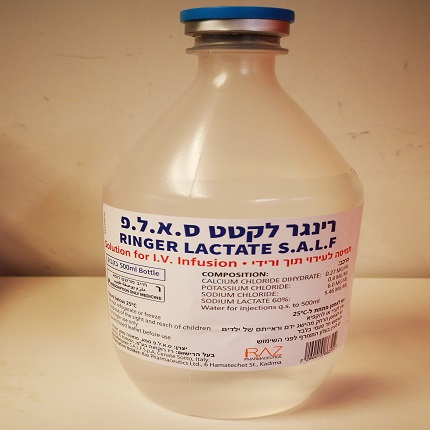Quest for the right Drug

רינגר לקטט ס.א.ל.פ RINGER LACTATE S.A.L.F (CALCIUM CHLORIDE DIHYDRATE, POTASSIUM CHLORIDE, SODIUM CHLORIDE, SODIUM LACTATE)
תרופה במרשם
תרופה בסל
נרקוטיקה
ציטוטוקסיקה
צורת מתן:
תוך-ורידי : I.V
צורת מינון:
תמיסה לאינפוזיה : SOLUTION FOR INFUSION
עלון לרופא
מינוניםPosology התוויות
Indications תופעות לוואי
Adverse reactions התוויות נגד
Contraindications אינטראקציות
Interactions מינון יתר
Overdose הריון/הנקה
Pregnancy & Lactation אוכלוסיות מיוחדות
Special populations תכונות פרמקולוגיות
Pharmacological properties מידע רוקחי
Pharmaceutical particulars אזהרת שימוש
Special Warning עלון לרופא
Physicians Leaflet
Interactions : אינטראקציות
4.5. Interaction with other medicinal products and other forms of interaction Ceftriaxone: See sections 4.3 and 4.4 for more information Drugs leading to an increased vasopressin effect The below listed drugs increase the vasopressin effect, leading to reduced renal electrolyte free water excretion and may increase the risk of hospital acquired hyponatraemia following inappropriately balanced treatment with I.V. fluids (see sections 4.2, 4.4 and 4.8). • Drugs stimulating vasopressin release include: Chlorpropamide, clofibrate, carbamazepine, vincristine, selective serotonin reuptake inhibitors, 3,4-methylenedioxy-N-methamphetamine, ifosfamide, antipsychotics,narcotics. • Drugs potentiating vasopressin action include: Chlorpropamide, NSAIDs, cyclophosphamide. • Vasopressin analogues include: Desmopressin, oxytocin, terlipressin. Other medicinal products increasing the risk of hyponatraemia also include diuretics in general and antiepileptics such as oxcarbazepine. Interaction related to the presence of sodium: Caution is advised when administering Ringer Lactate S.A.L.F to patients treated with drugs that may increase the risk of sodium and fluid retention (with oedema and hypertension), such as corticosteroids. Interaction related to the presence of potassium: Because of its potassium content, Ringer Lactate S.A.L.F should be administered with caution in patients treated with agents or products that can cause hyperkalaemia or increase the risk of hyperkalaemia, such as: - Potassium-sparing diuretics (amiloride, spironolactone, triamterene, alone or in association). - Angiotensin converting enzyme inhibitors (ACEI) and angiotensin II receptor antagonists. - Tacrolimus, cyclosporine. Administration of potassium in patients treated with such medications can produce severe and potentially fatal hyperkalaemia, particularly in patients with severe renal insufficiency. Interaction related to the presence of calcium: Administration of calcium may increase the effects of digitalis and lead to serious or fatal cardiac arrhythmia. Therefore, larger volumes or a faster infusion rates should be used with caution in patients treated with digitalis glycosides. - Caution is advised when administering Ringer Lactate S.A.L.F solution to patients treated with thiazide diuretics or vitamin D, as these can increase the risk of hypercalcaemia. - Bisphosphonates, fluoride, some fluoroquinolones and tetracyclines which are less absorbed (lower availability) when administered with calcium. Interaction related to the presence of lactate (which is metabolized into bicarbonate): Caution is advised when administering Ringer Lactate S.A.L.F to patients treated with drugs for which renal elimination is pH dependent. Due to the alkalinizing action of lactate (formation of bicarbonate), Ringer Lactate S.A.L.F may interfere with the elimination of such drugs. - Renal clearance of acidic drugs such as salicylates, barbiturates, and lithium may be increased because of the alkalinisation of urine by the bicarbonate resulting from lactate metabolism. - Renal clearance of alkaline drugs, such as sympathomimetics (e.g. ephedrine, pseudoephedrine) and stimulants (e.g. dexamphetamine sulfate, phenfluramine hydrochloride) may be decreased.

שימוש לפי פנקס קופ''ח כללית 1994
לא צוין
תאריך הכללה מקורי בסל
01/01/1995
הגבלות
תרופה מוגבלת לשימוש בבתי חולים או אשפוז יום
מידע נוסף
